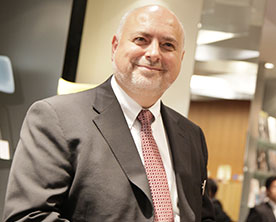Name: Jermy Hocking
Position : Vice President,Asia Pacific
Company: Herman Miller Inc.
Industry : Office Furniture Manufacturer
[paypal]
Jeremy joined Herman Miller in 1984.He has held many different roles in Sales and Marketing in Europe including VP of UK and Central Europe and VP of International Marketing.
In November 2008 he was appointed VP Asia Pacific and relocated with his family to Hong Kong. Six years ago he founded the Workplace Intelligence Unit with Forward Thinking in the UK which quickly estab- lished itself as a valuable “think tank” on all aspects of the workplace.
Jeremy is responsible for Herman Miller in India, South East Asia, China, Japan and Australia.
Working with colleagues he has set out to speed up new product introductions de- signed and manufactured in Asia to add to iconic range of global seating products and the design classics of Eames and Nelson.
He has steadily increased the accessibility of Herman Miller’s world class product portfo- lio throughout Asia by the appointment of additional Office Furniture Dealers. He has also developed and begun the implemen- tation of a Retail strategy to tap into Asia’s vibrant consumer opportunity.
Localization of product tooling and suppli- ers in Asia, a fast growing retail business and more distribution have all helped to cre- ate a Region which delivered $16m (13.8%) operating income in FY12.
Since late 2008 Jeremy has worked closely with Eric Yim, CEO of POSH in Hong Kong to make a success of the Alliance Distribu- tion Agreement. In April 2012, the acquisi- tion of POSH was successfully completed.
Jeremy graduated with a degree in Business and Marketing, and has completed the AMP at INSEAD in France.
He is married to Jayne with whom he has 4 children aged 22, 19, 17 and 14.
MI: When was the first time you visit- ed Myanmar?
This is my very first time visiting Myan- mar. The moment I get Yangon, I see many business opportunities are blooming in this country. I’m presently surprised by the in- ternet facilities, mobile phones and roaming facilities and also traffics. Myanmar has very good potential, business environment is ex- tremely favorable.
MI: What are your impressions of the country now?
Myanmar is a growing market in its own right. Along with its strategic location be- tween India and China, the two huge mar- kets, business opportunities are booming in the region. Accompany by its government reforms; it will be a top market in the region on coming years.
MI: What are you plans for Myanmar?
We have great hopes from the Asian market, especially India and China. We know that the customers in the region are price-con- scious but we are also aware that they yearn for world-class products. Herman Miller has established an Asian Research and Develop- ment Centre to identify the trends, habits and needs of people in Asia. With the coop- eration of MMRD Myanmar, Herman Miller plans to increase our distributorship and presence in the country.
MI: What effect do you think that the sudden influx of foreign companies/ nationals will have on the country and its people/culture?
I think it would be a good impact on the people. We, most western companies always follow the sustainability standards set by our governments and there would also be technological transfer from foreign compa- nies to local ones. In my opinion, the rela- tions between both will make local peoples’ lives “more productive, rewarding, delight- ful, and meaningful,” he says.
MI: How are you enjoying yourself here in Myanmar?
As this is my first time, I still do not know much about Myanmar. But it seems a pleas- ant country where people are nice, warm and hospitable. I am thinking to come back with my family in the near future.
MI: What are the Herman Miller’s long term objectives?
At Herman Miller, we respect each other as we are and focus on who we will become. Our culture represents the collective atti- tudes, aspirations, ideals, and experiences of the people who work here. With each other and with our customers, designers, dealers, suppliers, and contractors, good relationships are the basis of our networks around the world.
Each of us actively participates in under- standing problems and developing solu- tions. All of us work together to make a difference. We respect all expressions of human talent and potential. We value the unique perspectives, qualities, and contri- butions of every person in our community. The opportunity to contribute to a better world makes our work meaningful and re- warding.
We want to be the best, not the biggest in our domain.
MI: What is a sustainable design?
Making products which are basic, made with the minimum resources and are recy- clable. Customers today demand products which have credible sustainable design cre- dentials. Many of Herman Miller products have received certification for churning out products with environment friendly designs. This means using environmentally safe and healthy materials; design for material re-utilisation such as recycling or compost- ing; the use of renewable energy and energy efficiency; efficient use of water, maximum water quality associated with production among other factors.
MI: What design trends do you fore- see in the office and home furniture segment in Myanmar?
I foresee products which exude simplicity — simplicity in design and intensification of products. More and more people want prod- ucts that are beautiful, sustainable and are priced competitively.
MI: How different is Herman Miller from other furniture manufacturers?
Simplicity and desirability is important for us. We want to make designs that make peo- ple look at them and say, “I want to have this.” We have the willingness to take a risk by investing in constant innovation of de- sign. This helps us build world-class prod- ucts. Take the Aeron chair for instance.
It is an iconic design by Don Chadwick and Bill Stumpf (This chair has earned a place in the Museum of Modern Art’s permanent collection) and is still the fastest selling product at Herman Miller as it is regarded by many users as inherently very comfort- able due to its wide range of fit and adjust- ability. This proves that people are ready to buy products which offer comfort and value for money, even at a premium price. Not many furniture manufacturers concentrate on the seat. They only concentrate on the backrest of the chair. Thinking about both these aspects has helped us make products like Aeron.
MI: Are you planning to expand your presence in Myanmar and when would it be?
We are interested in prompting Myanmar companies to turn to quality furniture prod- ucts, which Herman Miller provides. South East Asia region is an extremely important market for our products.
Take a look at the number of international companies that have based themselves in cities like Bangalore and Hyderabad. We want to target them, apart from local com- panies. Currently we have our production facilities based in Southeast Asian countries
including China, but in the long run, we are going to establish a manufacturing unit in India.
MI: From a business standpoint, what do you feel are the biggest challenges facing you and your organization in Myanmar in the next 1-3 years?
We want to broaden our market in Myan- mar. The challenges will be that of perform- ing business and marketing in the newly en- vironment, which is still unfamiliar with our products. Our products are based on recycle material and environmentally sustainable
and the price would possibly be quite higher than the local products. I think that would mean the main challenge is making people, the customers, understand the quality of products.
MI: What’s next for Hermen Miller in Myanmar?
We want to strengthen our presence here, including finding new and different ways to contribute to and be a part of the growth story of Asia’s last frontier. We will certainly continue to focus on providing serviced of- fices and meeting spaces in Myanmar.
MI: what would be the typical issues that would make you cautions before putting money into Myanmar?
On the contrary, in western markets in Eu- rope and in the US, many companies are trying to reduce their real estate and to do more with less. This coupled with the sub- dued rate of GDP growth makes Asia the right place at the right time, for us to invest – and Myanmar is perfectly located for us to capture the opportunities in emerging mar- kets like India and China.
It’s important to reach out to the customers and link a network for people in the same business to connect to other players in the scene.
MI: If you could make one major change in the country, what would it be?
When I look at the industry here, I think it has not done a good job of showing how great design makes our world better. It’s simply devalued itself and the brand equity by focusing on being the cheapest. It would be the living standard of the people that I want to change, or in other words, being
raised.
MI: What message would you give to the Hermen Miller’s customers in Myanmar?
The customer who wants to buy a fake or a copy is not a Herman Miller customer. We’re trying to make the world a better place, a more beautiful place through design.[/paypal]










